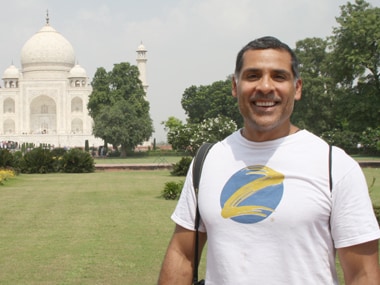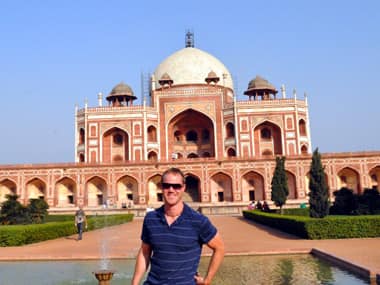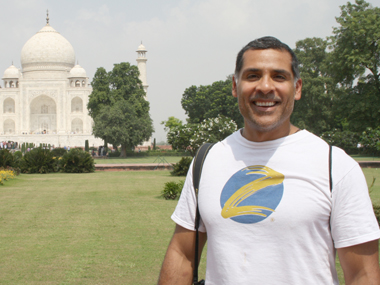New York, Dec 17 – The Supreme Court which turned the clock back with a gay sex ban didn’t send out a welcoming message, but American gay tourists are not letting it put a wrinkle in their vacation plans. US companies which cater to gay tourists say their clients see India as a fascinating travel destination well stocked with palaces, tombs, Hindu temples, beaches and ordinary village life. [caption id=“attachment_1291169” align=“alignleft” width=“380”]
 Joel Cabrera, co-owner of Zoom Vacations which caters to gay tourists[/caption] “None of our guests have called to cancel their trip to India,” Joel Cabrera, chief travel officer and co-owner of Chicago-based Zoom Vacations, which caters to gays, lesbians and their family and friends, told Firstpost. “We research the trip thoroughly so that we only stay in gay-friendly hotels. Our guests are hand-held through their trip to India,” says Cabrera. Zoom Vacations has planned a swing through Rajasthan where guests will stay at the majestic Lake Palace Hotel in Udaipur, Oberoi Amarvillas and Rambargh Palace among other top palace hotels. High-end US travelers have snapped up the $8,000 holiday package which doesn’t include air fares. After the Delhi High Court decriminalized gay sex in 2009, India tapped into the potentially lucrative global gay tourism industry which is pegged at over $670 million. “If there are major global movements to boycott Russia over its gay rights, what will happen with India?" asked the Washington Post after the Supreme Court shocked people around the world, who had expected it simply to rubber-stamp the earlier High Court ruling. “Despite the setback India’s gay culture has opened up. Gay travelers know they don’t have a target painted on their backs,” said a member of the Indian Association of Tour Operators. “People are more upset about going to a place like Russia because the authorities are aggressively anti-gay. The courts can say what they want but Indian people are very gentle, loving and accepting,” says Cabrera who has travelled extensively through India. “I think we should continue to go to India and support Indian gays and show how this law is silly.” The Washington Post’s WorldViews blog produced a map showing in which countries homosexuality is criminalised, including much of Africa, the Middle East and South Asia. Unfortunately, India missed its opportunity to free itself from the oppressive 152-year-old colonial era law. The anti-gay Supreme Court ruling now puts India behind our neighbor to the north. Nepal started to sell itself as a gay tourist destination after the country made large strides forward on gay-rights issues. In December 2007, Nepal’s Supreme Court ordered the government to ensure the rights of gays and lesbians, decriminalizing homosexuality. [caption id=“attachment_1291171” align=“alignleft” width=“380”]
Joel Cabrera, co-owner of Zoom Vacations which caters to gay tourists[/caption] “None of our guests have called to cancel their trip to India,” Joel Cabrera, chief travel officer and co-owner of Chicago-based Zoom Vacations, which caters to gays, lesbians and their family and friends, told Firstpost. “We research the trip thoroughly so that we only stay in gay-friendly hotels. Our guests are hand-held through their trip to India,” says Cabrera. Zoom Vacations has planned a swing through Rajasthan where guests will stay at the majestic Lake Palace Hotel in Udaipur, Oberoi Amarvillas and Rambargh Palace among other top palace hotels. High-end US travelers have snapped up the $8,000 holiday package which doesn’t include air fares. After the Delhi High Court decriminalized gay sex in 2009, India tapped into the potentially lucrative global gay tourism industry which is pegged at over $670 million. “If there are major global movements to boycott Russia over its gay rights, what will happen with India?" asked the Washington Post after the Supreme Court shocked people around the world, who had expected it simply to rubber-stamp the earlier High Court ruling. “Despite the setback India’s gay culture has opened up. Gay travelers know they don’t have a target painted on their backs,” said a member of the Indian Association of Tour Operators. “People are more upset about going to a place like Russia because the authorities are aggressively anti-gay. The courts can say what they want but Indian people are very gentle, loving and accepting,” says Cabrera who has travelled extensively through India. “I think we should continue to go to India and support Indian gays and show how this law is silly.” The Washington Post’s WorldViews blog produced a map showing in which countries homosexuality is criminalised, including much of Africa, the Middle East and South Asia. Unfortunately, India missed its opportunity to free itself from the oppressive 152-year-old colonial era law. The anti-gay Supreme Court ruling now puts India behind our neighbor to the north. Nepal started to sell itself as a gay tourist destination after the country made large strides forward on gay-rights issues. In December 2007, Nepal’s Supreme Court ordered the government to ensure the rights of gays and lesbians, decriminalizing homosexuality. [caption id=“attachment_1291171” align=“alignleft” width=“380”]
 Bryan Herb, co-owner of Zoom Communications, which caters to gay tourists[/caption] At the forefront of this battle has been Nepal’s openly gay lawmaker Sunil Babu Pant who launched Pink Mountain, the nation’s first travel agency to cater exclusively to gay tourists. India may not be as gay-friendly as Nepal, but outright harassment has never been a major problem for gay foreigners travelers in India. “After the ruling, people suggested that we would no longer offer tours to India. Boycotting gay tourism to anti-gay countries is often the assumption of what should happen after a discriminatory ruling. People forget that in the affected country, there are gay business owners who need our financial support more than ever. We will still come to India, and we will use hotels and tour guides who are gay, or who have demonstrated a commitment and full embracing of the gay community,” said Bryan Herb, chief marketing officer and co-owner of Zoom Vacations. “At a time when India needs positive PR, in light of several rape cases that made global news, it is unfortunate that this ruling has cast India as once-again archaic, unloving, and apathetic. This is not the India that I know and love with all my heart. To say I was disappointed by the news of the ruling would be an extreme understatement,” added Herb. Not surprisingly, the Supreme Court’s decision to reverse the High Court’s decision striking down the British colonial-era law criminalising gay sex was condemned by the US State Department, activists and the media. The New York Times
called
the decision “disgraceful”. Although the Supreme Court contended that it was the parliament’s responsibility to repeal the law, they argued that this was “disingenuous”. “Given the fractious nature of India’s Parliament, the conservative views of many of its members, and the political stakes in the run-up to general elections next spring,” said The New York Times, “the legislature is unlikely to take up this issue on its own.” The Washington Post described it as “a huge failure” and “major setback” for the world’s largest democracy.
Bryan Herb, co-owner of Zoom Communications, which caters to gay tourists[/caption] At the forefront of this battle has been Nepal’s openly gay lawmaker Sunil Babu Pant who launched Pink Mountain, the nation’s first travel agency to cater exclusively to gay tourists. India may not be as gay-friendly as Nepal, but outright harassment has never been a major problem for gay foreigners travelers in India. “After the ruling, people suggested that we would no longer offer tours to India. Boycotting gay tourism to anti-gay countries is often the assumption of what should happen after a discriminatory ruling. People forget that in the affected country, there are gay business owners who need our financial support more than ever. We will still come to India, and we will use hotels and tour guides who are gay, or who have demonstrated a commitment and full embracing of the gay community,” said Bryan Herb, chief marketing officer and co-owner of Zoom Vacations. “At a time when India needs positive PR, in light of several rape cases that made global news, it is unfortunate that this ruling has cast India as once-again archaic, unloving, and apathetic. This is not the India that I know and love with all my heart. To say I was disappointed by the news of the ruling would be an extreme understatement,” added Herb. Not surprisingly, the Supreme Court’s decision to reverse the High Court’s decision striking down the British colonial-era law criminalising gay sex was condemned by the US State Department, activists and the media. The New York Times
called
the decision “disgraceful”. Although the Supreme Court contended that it was the parliament’s responsibility to repeal the law, they argued that this was “disingenuous”. “Given the fractious nature of India’s Parliament, the conservative views of many of its members, and the political stakes in the run-up to general elections next spring,” said The New York Times, “the legislature is unlikely to take up this issue on its own.” The Washington Post described it as “a huge failure” and “major setback” for the world’s largest democracy.
Gay sex ban isn't stopping gay foreign tourists from coming to India
Uttara Choudhury
• December 17, 2013, 14:00:31 IST
The Supreme Court which turned the clock back with a gay sex ban didn’t send out a welcoming message, but American gay tourists are not letting it put a wrinkle in their vacation plans
Advertisement
)
End of Article